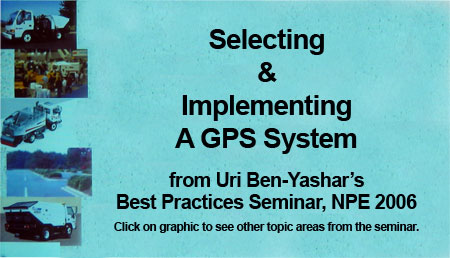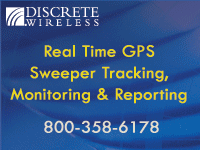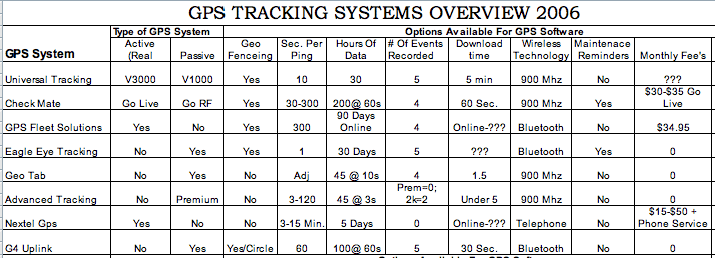Best Practices |
Selecting and Implementing a Global Positioning System
This information was provided by one of the focus groups at the seminar organized by Uri Ben-Yashar at NPE 2006. This focus group provided an overview on GPS systems as they apply to parking area sweeping.Topic area moderator was Mike Lucht, principal in Progressive Sweeping, Inc. Presenter was Scott Dare, principal of sweeping and maintenance company, Dare Living Associates, Inc..by Ranger Kidwell-Ross
Non-sweeping stops and speed of the sweeper can be tracked. An employee can be found out if they're sweeping somewhere that's not on the route sheet, for example. You can determine if speeding has occurred, either on a road or through the parking lot. This latter improves safety.
Mapping software can be used to show all the locations where sweeping accounts are located. Exact amount of time in each account lot may be determined, both per night and as an average over time. This is excellent for knowing what the profit margin is per account. Distance between stops is also something that may be shown, so you can determine all the non-sweeping time built in to each route. 
Items like when the auxiliary engine was operating, sweeping head down, etc., may be tracked. In some instances, an operator may actually sweep the wrong shopping center or other account and not even know it. A flag can be configured to automatically come up to show that the vehicle went to a location not on the route. GPS can be configured to integrate with schedules, routing, maintenance and billing. There is a tremendous amount of great information that can be generated by a GPS unit. Data entry is minimized, since data can become auto-entered via the GPS. This represents a cost-savings. 
Live directions and navigation is available in some of the systems, showing the exact way to get from one account to another. GPS systems generally categorize into either 'active' or 'passive' systems. Active systems have a live stream of data coming in to the system at all times during operation. These are usually more expensive, but allow a manager or owner to view, via their computer, where each GPS-equipped sweeper is at all times. Active systems are relatively more expensive, so passive was recommended unless the managers will be actually reviewing sweeper data and locations during sweeping shifts. As a contrast, passive systems take 'snapshots' of data points and the information is not available in real time. Typically, the information is downloaded onto the office computer after each shift. By looking at all the individual data points, a determination may be made that covers, in most cases, everything many sweeper owners want to know about what occurred. Ability to merge the data into your office computer system is very important. Make sure you evaluate thoroughly how you're able to manipulate the data once you've collected it all. That's a very important factor, since you need your management to be able to view it and utilize the collected information in running the business. One non-standard area that was suggested to monitor via GPS is weight of hopper. This would allow billing customers by the weight of the material actually picked up on their site, since that's what drives the cost of dumping. This could be important for clients where you're not dumping into their dumpsters. The following is a screenshot of the spreadsheet information presented that compares the capabilities of some of the more well-known GPS providers: 
If you have any questions about any of the above ideas, feel free to contact the WorldSweeper.com Team for a further explanation. |
© 2005 - 2012
|
Parking Area Sweeping Contents
|